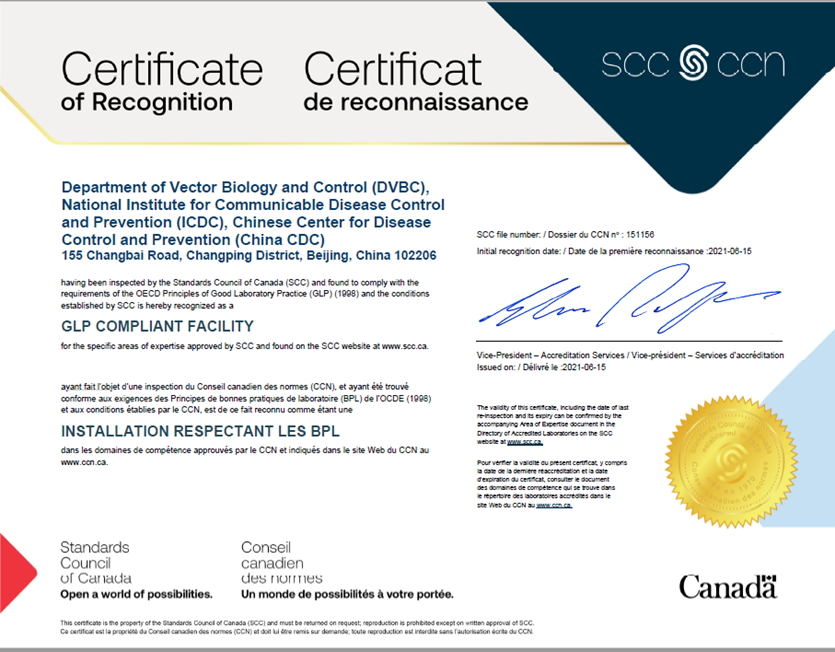postion: National Institute for Communicable Disease Control and Prevention>>WHOCCVSMWHOCCVSM
WHO Collaborating Centre for Vector Surveillance and Management
• General information
• On 22 October 2012, the World Health Organization(WHO)designated the Department of Vector Biology and Control of National Institute for Communicable Disease Control and Prevention (ICDC), Chinese Center for Disease Control and Prevention (China CDC) as the WHO Collaborating Centre for Vector Surveillance and Management. Prof. Qiyong Liu was designated as the director of the CC for a four-year term.
• On 22 October 2020,the CC was re-designated by WHO, Prof. Qiyong Liu was redesignated as director of the CC, and the third term will be until October 20, 2024.
• Certified public health pesticide evaluation inspection unit of the Ministry of Agriculture and Rural Affairs.
• National center for vector surveillance and control in China.
• More than 20 times public health and emergency rescues, more than 38 times visiting abroad, and more than 40 times visiting & training in China.
• Rich experience in control of malaria, dengue, chikungunya, yellow fever and other mosquito-borne diseases, plague and other rodent-borne diseases, and earthquake, tsunami, flood and other public health emergency rescue.
• Put forward Sustainable Vector Management (SVM) and it was cited by WHO technical guidelines.
• OECD GLP Compliant Facility with recognition area as Efficacy of Insecticidal Products by the Standard Council of Canada (SCC).
• Subject
• Vector biology & control
• Viral hemorrhagic fevers
• Communicable diseases other than those specifically mentioned
• Types of activity
• Training and education
• Organization of events (e.g. conferences; summits)
• Product development (guideline; manual; methodologies; etc.)
• Responsible Officer
• VELAYUDHAN Raman
• Technical Counterpart
• YAJIMA Aya
• Terms of Reference, TOR
TOR1: In agreement with WHO and under its guidance, provide technical support on entomological surveillance including insecticide resistance monitoring, vector control for vector-borne diseases (VBDs) and drafting regional plans of work on the control and elimination of VBDs based on principles of integrated vector management (IVM) and sustainable vector management (SVM) in line with WHO’s work).
At WHO’s request and under its guidance:
a) to participate in the review and development of IVM and SVM handbook, training modules and M&E framework organized by WHO and at country level;
b) to implement IVM and SVM principles and approaches in vector-borne disease control in China and document case-studies (1949-2020) in line with WHO’s guidelines;
c) to promote IVM and SVM through agreed communication channels;
d) to provide technical support to WHO on vector surveillance and control of vectors and pests of public health importance, including pests of public health importance, including mosquitoes, rodents, ticks and fleas, as and when necessary.
Expected deliverables
• Establishment of vector surveillance and monitoring in China and other countries where capacity is build. The activities to be performed by the WCC are in no case related or leading to the development and issuance of qualifying diplomas (e.g. MA, MSc, PhD) or delivery of courses offered as part of an established degree programme. The WHO name and emblem my not be used on certificates of attendance, diplomas or similar awards to participants in training or other courses organized as part of a WHO CC’s work plan. Technical reports need to be prepared and sent to WHO.
Activity timeframe: 2021-2024;
TOR2: As requested by WHO, conduct training workshops and drafting training modules on vector surveillance and control for the management of vector-borne and arbo-viral diseases.
At WHO’s request and under its guidance:
a) to provide technical assistance for the annual training workshop in the Africa and Asia regions based on agreed work plan and approved projects plans;
b) Support WHO in selection of national and international participants and facilitators and utilize existing WHO publications and training modules for training.
Expected deliverables;
• Capacity built in at least 6 countries during the period. The activities to be performed by the WCC are in no case related or leading to the development and issuance of qualifying diplomas (e.g.MA, MSc, PhD) or delivery of courses offered as part of an established degree programme. The WHO name and emblem may not be used on certificate of attendance, diplomas or similar awards to participants in training or other courses organized as part of a WHO CC’s work plan. The measurable output would be the number of workshops organized per year.
Activity timeframe: 2021-2024;
TOR3: At WHO’s request, strengthen collaboration with other WHO Collaborating Centres related with VBDs, and undertake research and training base in representative region in China.
At WHO’s request and under its guidance:
a) to carry out joint action and promote information sharing and exchange among these WHO Collaborating Centres and establish the Vector Surveillance and Management research and training base in varying climate zone such as tropical region in China.
Expected deliverables;
• Harmonized reporting of all activities done by vector biology and control collaborating Centres and sharing of expertise. Reports of joint activities should be prepared and shared with WHO.
Activity timeframe: 2021-2024;
TOR4: At WHO’s request, provide technical support for control of rodents, ectoparasites and rodent-borne diseases, as and when necessary.
At WHO’s request and under its guidance:
a) Provide technical support on rodent borne disease control;
b) Support the identification of rodents and common ectoparasites in the region;
c) Develop appropriate training materials on these topics in collaboration will WHO;
d) Support the translation of select WHO publication to Chinese.
Expected deliverables;
• Training materials and reports of work in assigned countries. The activities to be performed by the WCC are in no case related or leading to the development and issuance of qualifying diplomas (e.g. MA. MSc, PhD) or delivery of courses offered as part of an established degree programme. The WHO name and emblem may not be used on certificates of attendance, diplomas or similar awards to participants in training or other courses organized as part of a WHO CC’s work plan.
Activity timeframe: 2021-2024;
Appendix:Certificate of Recognition OECD GLP

Certificate of Recognition